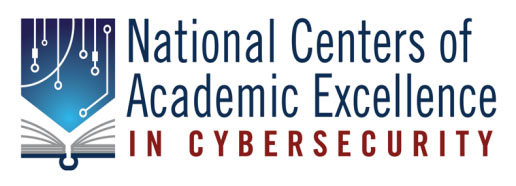Cybersecurity Center
Welcome to the Cybersecurity Center, Macomb Community College’s virtual and on-ground repository of information about its cybersecurity practices and academic programs. The Center, physically located in C Building, Room 258, South Campus, also serves as a resource for up-to-date information on cybersecurity issues and cyber-awareness.
National Center of Academic Excellence in Cyber Defense Education
Having met the rigorous standards of the National Security Agency (NSA) and the Department of Homeland Security (DHS), Macomb has received their jointly awarded designation as one of the National Centers for Academic Excellence in Cyber Defense Education Program (CAE-CDE) Associate Level, through 2024. This designation signifies that Macomb’s academic programs are mapped to NSA/DHS-approved curriculum and contribute to the security of the nation’s information infrastructure by preparing students to be highly capable cybersecurity experts.
For more information:

Committed to Student Success and Cyber-Awareness
Macomb's Cybersecurity Center serves the college, its students, faculty and staff, and the community by:
- Providing cybersecurity education that is innovative, comprehensive and interdisciplinary.
- Engaging with employers in both public and private sectors to ensure that academic coursework remains responsive to current and evolving cybersecurity needs.
- Assisting students in the college's cybersecurity programs to ensure they are making academic progress toward program completion, transfer and/or placement in the field.
- Developing ongoing working relationships with local school districts to educate and interest K-12 students in cybersecurity and related career opportunities.
- Developing and maintaining articulation agreements with four-year institutions that offer advanced degrees in Information Technology.
- Continuously improving the quality and relevance of the cybersecurity education provided at Macomb.
- Promoting cyber-awareness as the public's best defense against cyberattacks and data breaches.
National Oversight, Certified Faculty
The Cybersecurity Center and the Associate of Applied Science in Cybersecurity Program follow the guidelines of the Department of Homeland Security and National Security Agency in setting direction for the center and the objectives and outcomes of the cybersecurity courses offered.
Professor Keith Nabozny has been the faculty lead and point-of-contact for Macomb’s cybersecurity program since 2011 and is responsible for the Cybersecurity Center. Prior to teaching at Macomb, Professor Nabozny worked in the information technology industry for over 15 years, providing networking and cybersecurity support to large companies with operations in Michigan and other locations around the world. He has been a Certified Information Systems Security Professional (CISSP) since 2009 and holds a Master’s Degree in Education from Wayne State University.
Professor Nabozny can be contacted at naboznyk@macomb.edu or 586.445.7304.
Programs at Macomb Related to Security
- Cybersecurity
- Center of Academic Excellence - Program of Study
- Homeland Security
- Cybersecurity Bootcamp
- Skill-Specific
- The objective of the bootcamp is to teach the fundamentals of cybersecurity and prepare you for the CompTIA Security+ certification exam. Recommended to have basic knowledge of IT fundamentals and basic networking knowledge. For more information email continuinged@macomb.edu.
Cybersecurity Club/Opportunities for Students
Macomb’s Cybersecurity Club is a student-led group that provides an opportunity for students with an interest in cybersecurity to gather and discuss topics of interest. It meets from 4:00 to 5:30 pm on Tuesdays during fall and winter semesters in the Cybersecurity Center, South Campus, C Building, Room 258.
If a student is interested in participating in online cybersecurity competitions (i.e. National Cyber League), club meetings are an ideal place to discuss ideas and strategies for success. Students may also consider joining the National Cybersecurity Student Association, which provides networking, mentoring, training and scholarship opportunities. Scholarships for Women Studying Information Security are also available through Computing Research Associates.
You do not need to be enrolled in the Cybersecurity, AAS Program to be a member of the Cybersecurity Club! Any Macomb student can join and participate in meetings or events.
For more information about the Cybersecurity Club, contact the faculty advisor, Professor Keith Nabozny, at: naboznyk@macomb.edu or 586.445.7304.

Cybersecurity in Practice
At Macomb, cybersecurity best practices are followed to effectively secure the college’s information infrastructure.
Macomb’s security guidelines are available for review on the college’s website, while cybersecurity staff offer these 10 tips for safeguarding electronic data.
Macomb’s Acceptable Use of Information Technology Resources policy provides guidance regarding computer and network use at the college.
If you believe you have detected a cybersecurity issue related to college resources, please contact the IT Department using the Client Portal Service Desk (My Macomb).
Or email them at: servicedesk@macomb.edu
More Information
The Cybersecurity Center includes a Board of Advisors that provide oversight, industry expertise, and connection with the local community. The current Board of Advisors includes:
- Wolfgang Goerlich
- Judy Jarvis
- Connor Juretich
- Michelle Matte, Cybersecurity Specialist
- Stephanie Munier
- Robert Nowack
- Brandon Powell, Bunkerhill Health
- Bernard Rivers
- Chriss Roberts, ATS Midwest
- Greg Willoughby, Mayco International, LLC
- A representative from First State Bank
View our events page for upcoming cybersecurity events as well as a look back at past events.
Check this page often for important news and updates to local, state and national stories concerning cybersecurity concerns and recent breaches.
23andMe Data BreachThe recent 23andMe hack targeting users with Jewish ancestry raises concerns about data privacy, prompting advice for users to reset passwords and enable two-factor authentication, request data deletion, and reconsider sharing genetic information due to potential risks like discrimination and targeted attacks; however, critics argue that the burden of data protection should be on the companies, urging lawmakers to enforce stricter privacy and security regulations.
Rapid Reset Vulnerability Sets RecordsAmazon Web Services (AWS), Cloudflare, and Google have taken measures to mitigate record-breaking distributed denial-of-service (DDoS) attacks using the HTTP/2 Rapid Reset technique, a zero-day flaw in the HTTP/2 protocol that allows threat actors to overwhelm websites by rapidly canceling HTTP/2 streams, with Google's cloud infrastructure experiencing peak attacks at 398 million requests per second and AWS and Cloudflare facing volumes of 155 million and 201 million requests per second, respectively.
Botnet Exploits Zero-Day Vulnerabilities
The Akamai Security Intelligence Response Team has identified two zero-day vulnerabilities with remote code execution exploited in the wild, actively used to build a distributed denial-of-service (DDoS) botnet targeting routers and network video recorder devices through default admin credentials and Mirai variants, with details pending vendor updates expected in December 2023.
Student Loan Breach Exposes 2.5M Records
EdFinancial and the Oklahoma Student Loan Authority are notifying over 2.5 million loanees about a data breach involving Nelnet Servicing, which exposed personal information, including names, addresses, email addresses, phone numbers, and social security numbers, with the breach occurring between June 1, 2022, and July 22, 2022, potentially leading to future social engineering and phishing campaigns despite users' financial information being protected.
Internal News
These Michigan colleges and universities are also Centers for Academic Excellence and accept credits transferred from Macomb’s Cybersecurity program.

Students in Macomb’s Cybersecurity Club regularly participate in many cybersecurity events, including the GrrCon Cybersecurity Summit and Hackers Conference held last September.
Local Cybersecurity Groups
- Motor City ISSA – Local chapter of the Information Systems Security Association
- ISACA Detroit – Local chapter of the Information Systems Audit and Control Association
- MADCAT – Michigan Automotive & Defense Cyber Awareness Team
External Cybersecurity Resources
Here are some external sources with information related to cybersecurity:
- State of Michigan Cybersecurity page – including the Governor’s Cybersecurity Dashboard and Cyber Disruption Plan
- Security News from SC Magazine
- News and analysis from Brian Krebs
- IT and business security news from Threatpost.com
- Phishing: Reduce your risk!


